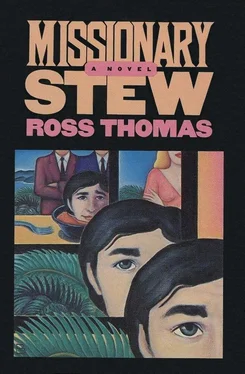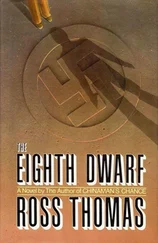Ross Thomas - Missionary Stew
Здесь есть возможность читать онлайн «Ross Thomas - Missionary Stew» весь текст электронной книги совершенно бесплатно (целиком полную версию без сокращений). В некоторых случаях можно слушать аудио, скачать через торрент в формате fb2 и присутствует краткое содержание. Город: New York, Год выпуска: 1983, ISBN: 1983, Издательство: Simon & Schuster, Жанр: Политический детектив, на английском языке. Описание произведения, (предисловие) а так же отзывы посетителей доступны на портале библиотеки ЛибКат.
- Название:Missionary Stew
- Автор:
- Издательство:Simon & Schuster
- Жанр:
- Год:1983
- Город:New York
- ISBN:978-0-671-49363-9
- Рейтинг книги:3 / 5. Голосов: 1
-
Избранное:Добавить в избранное
- Отзывы:
-
Ваша оценка:
- 60
- 1
- 2
- 3
- 4
- 5
Missionary Stew: краткое содержание, описание и аннотация
Предлагаем к чтению аннотацию, описание, краткое содержание или предисловие (зависит от того, что написал сам автор книги «Missionary Stew»). Если вы не нашли необходимую информацию о книге — напишите в комментариях, мы постараемся отыскать её.
Missionary Stew — читать онлайн бесплатно полную книгу (весь текст) целиком
Ниже представлен текст книги, разбитый по страницам. Система сохранения места последней прочитанной страницы, позволяет с удобством читать онлайн бесплатно книгу «Missionary Stew», без необходимости каждый раз заново искать на чём Вы остановились. Поставьте закладку, и сможете в любой момент перейти на страницу, на которой закончили чтение.
Интервал:
Закладка:
Replogle lit a cigarette, which Haere noted was still an unfiltered Lucky Strike, and said, “I knew I had cancer at least two months before they cut me open down in Houston.”
“How?”
“My plumbing started backing up. I figured it was the prostate. When they went in, they found out there wasn’t much they could do, so they sort of patched me up and reamed me out and now I come backwards.” He paused. “Except I haven’t been doing much of that lately either, although there is this one lovely I’ve known for years who’s got a lady friend, and once a week or so we all three get together and play a mild game of Lincoln logs. Very mild. Almost geriatric.”
“Well, an orgy’s an orgy, I guess,” Haere said. “How’s Maureen?” Maureen was Replogle’s wife of twenty-seven years.
“Maureen,” he said. “Let me tell you about Thanksgiving.”
“Which Thanksgiving?”
“This one.”
“It’s still two weeks away.”
“Not at my house. At my house they had Thanksgiving last Thursday on account of they don’t think I’m going to last through Christmas, which sure as hell won’t bother me too much.”
Replogle paused and put his cigarette out in the car’s ashtray. “Well, they’re all there, Maureen’s family, gathered around the table — her three brothers, already half in the bag, and their godawful wives, and maybe half a dozen assorted nephews, all of them nine feet tall and out of work, and Maureen’s old man who’s ninety-two and barking about how he’s not going to eat any fucking turkey because what really wants is Salisbury steak. That’s what they always call hamburger in Maureen’s family. Salisbury steak.”
“Class,” Haere said.
“So there we all are, the pot smoke so thick you could can it, my brothers-in-law shitfaced, my sisters-in-law arguing about what TV show they’re going to watch, Maureen’s old man complaining about his goddamn Salisbury steak being too rare, and suddenly Maureen announces that we’re going around the table so everybody can say what they’ve got to be thankful for — starting with me.”
“Norman Rockwell,” Haere said.
“Exactly. Well, they’re all looking at me and I just sat there and didn’t say anything for a while. And then I said, ‘What the fuck have I got to be thankful for? I’ve got cancer.’ Well, you should’ve seen their faces.” Replogle chuckled at the memory and then said, as though repeating a favorite punch line, “What the fuck have I got to be thankful for? I’ve got cancer.”
After that he started to laugh, and he went on laughing until Draper Haere joined in out of what he later decided was self-defense.
Chapter 3
Had it not been for the actress Craigie Grey, it is doubtful that Draper Haere would ever have found and retained the services of Morgan Citron, who, for the past year, had been living on the $6,000 he had realized in Paris from the sale of the somewhat flawed two-carat diamond.
Until the money ran out, Citron had lived the year in a converted two-car garage in Venice, California, only a block from the beach. The rent had been $300 a month for the one large room with its cement floor, toilet, sink, and the jerry-built shower that was rigged up out of a garden hose. For heat and cooking, there was a two-burner hot plate.
Citron spent much of his time during that year in the comfortable Santa Monica library reading old travel books, the older the better, and anything he could find on cannibalism, which was not very much. When not in the library, he was usually down on the beach, where he watched the people, but talked to virtually no one, and sipped carefully, even sparingly, from his daily bottle of cheap red wine. He talked to virtually no one because his disease was still in remission. It had gone into remission shortly after he was jailed and he often suspected that he was cured of it forever. The disease that Citron no longer suffered from was curiosity.
Citron’s one meal a day was taken in the evening and usually consisted of a large bowl of what he still insisted on thinking of as pot au feu , which simmered sporadically on the hot plate and whose ingredients were suspect vegetables, meat and chicken bought on sale with blackmarket food stamps at Boys Market in the Marina del Rey. Sometimes Citron also bought day-old bread. He once estimated that he was living slightly more than $1,000 a year beneath the federal government’s official poverty line, which that year was $4,680.
After the diamond money finally ran out and he was down to his last $32.64, Citron packed what little he owned into the trunk and backseat of his one luxury, a 1969 Toyota Corona sedan, and headed north to a spot on the Pacific Coast Highway about halfway between Malibu and Oxnard. It was there that the Cadillac People lived.
The Cadillac People into whose midst Citron settled were called that because that’s what some of them lived in — old Cadillac sedans with savaged fenders and rust spots and backseats jammed with whatever their owners couldn’t bear to part with. Other Cadillac People lived in equally old Lincolns and Chrysler Imperials and huge Ford station wagons and converted school buses and homemade campers that perched haphazardly on the beds of senile pickup trucks. It was a community of sorts, an anarchists’ community perhaps, parked defiantly and illegally at the edge of the continent on land owned by the state. Occasionally, the highway patrol stopped by and halfheartedly shooed the Cadillac People away. But they almost always drifted back.
Some of the Cadillac People drank. Some didn’t. Nearly all of them slept in their cars and used the ocean as their combination bathroom and TV set. They sat there in the mild sunshine, day after day, on the western edge of the American dream, listening mostly to country-western radio music because of the stories it told, drumming bored fingers on worn doorsills, and staring out through tinted windshields at the Pacific as they waited for something inevitable to happen — death perhaps; certainly not taxes.
For three weeks Citron had waited with them and listened to their stories, which, like the country-western lyrics they favored, usually involved cheating lovers, faithless friends, venal employers, and feckless offspring.
“You know what this is kinda like?” the Cadillac People’s resident philosopher had once asked Citron. “This is kinda like a real bad double feature. You sit here waitin’ for this one to end and the other to begin, except you know damn well the second one ain’t gonna be no better’n the first. But you wait anyhow.”
During what he sometimes later came to think of as Life’s Intermission, Citron gambled four gallons of gasoline to drive into Venice and back to check out his post-office box. Another six months’ rent would be due on the box in two weeks. Citron had no plans to pay it.
The post-office box in Venice was Citron’s last outpost, his final link with civilization. It was where dunning letters could be sent; where strangers could implore him to buy their costly goods and services; where his oldest and dearest friends could send him money orders and entreaties to come and stay with them forever; where warmhearted foundations could offer him grants-in-aid; and where somebody, somewhere, could write to tell him that she loved him.
What Citron found in the post-office box were four letters from the Internal Revenue Service, which he tossed, unopened, into the wastebasket. There were also nineteen pieces of junk mail, which were also discarded, and two letters from the American Express Company, forwarded from Paris, which he assumed to be rude demands for payment and which he also tossed away unread, unopened.
The one letter Citron did open was prettily addressed to him by hand in brown ink. It was an invitation to an American Civil Liberties Union fund-raiser in Bel-Air. Citron assumed the ACLU had somehow got his name and address from Amnesty International.
Читать дальшеИнтервал:
Закладка:
Похожие книги на «Missionary Stew»
Представляем Вашему вниманию похожие книги на «Missionary Stew» списком для выбора. Мы отобрали схожую по названию и смыслу литературу в надежде предоставить читателям больше вариантов отыскать новые, интересные, ещё непрочитанные произведения.
Обсуждение, отзывы о книге «Missionary Stew» и просто собственные мнения читателей. Оставьте ваши комментарии, напишите, что Вы думаете о произведении, его смысле или главных героях. Укажите что конкретно понравилось, а что нет, и почему Вы так считаете.












